Liubao's brews were celebrated in the olden days and are now reclaiming their former glory, Wang Kaihao and Shi Ruipeng report in Wuzhou, Guangxi Zhuang autonomous region.
Fried, rolled and withered. Loose green leaves turn dark as the lingering aroma of tea spills from heated pots, filling the air of a workshop in the mountainous village of Tangping.
The process may look easy to a layperson but the ideal conditions such as timing and temperature are controlled by tea growers that take years if not decades of experience.
Wei Jiequn, 62, is a fourth-generation tea cultivator and resident of Tangping, which is located in Liubao town in the Guangxi Zhuang autonomous region's Wuzhou city.
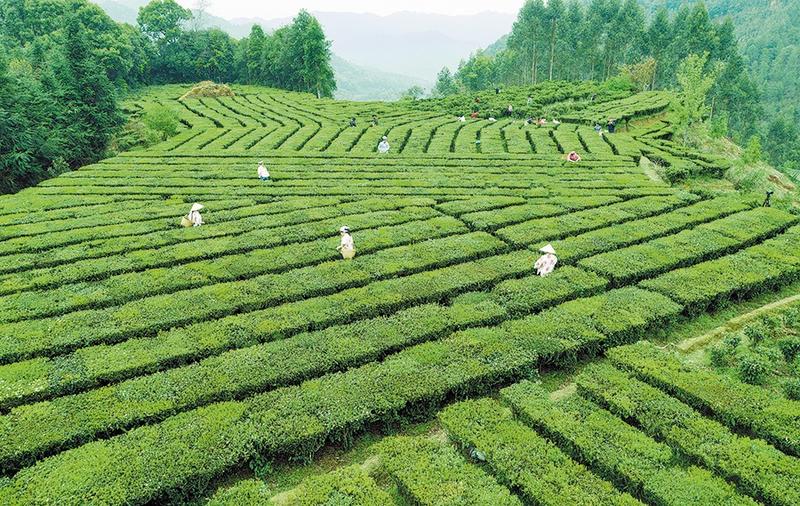 A tea plantation in Daning village, Liubao town. (PHOTO PROVIDED TO CHINA DAILY)
A tea plantation in Daning village, Liubao town. (PHOTO PROVIDED TO CHINA DAILY)
"Tea sustains my inner peace. When you are in a good mood, the tea you make will be tasty. If you lose your temper, the flavor will change," says Wei.
In 2017, Wei was named as a national-level inheritor of intangible cultural heritage for her tea-processing technique.
Though machines have been widely used in processing tea, Wei says the skills involved in hand-making are "irreplaceable".
"The aroma can only be fully aroused through natural fermentation when the tea is processed by hand," she says.
"And the shapes of leaves are better when manually rolled."
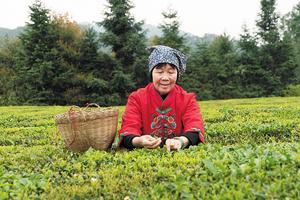 Wei Jiequn picks up tea leaves. (PHOTO PROVIDED TO CHINA DAILY)
Wei Jiequn picks up tea leaves. (PHOTO PROVIDED TO CHINA DAILY)
The signature tea of Liubao became known outside the area through the waterways, by ships that carried the tea across the Pearl River, finally setting off on its overseas voyage from Guangzhou, Guangdong province. The trade route was known as the "tea boat road".
Local records show that this famed variety has a 1,500-year history, and its popularity reached the peak during the Ming (1368-1644) and Qing (1644-1911) dynasties. Liubao tea was given in tribute to Qing emperor Jiaqing.
Many Guangdong laborers who emigrated to Southeast Asia in the 19th century used the tea as a drink to counter humid and hot weather. It was particularly welcomed among Chinese miners.
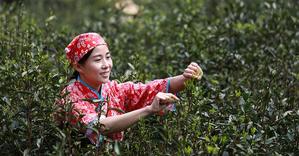 Shi Rufei picks up tea leaves. (PHOTO PROVIDED TO CHINA DAILY)
Shi Rufei picks up tea leaves. (PHOTO PROVIDED TO CHINA DAILY)
Family business
A collectively owned tea factory was established in Liubao in 1972. Four years later, Wei, then 18 years old, began to work there. She met her future husband, who became head of the factory.
Tea was not only the matchmaker for their romance and marriage but also the witness to their toughness. A fire broke out in the factory in 1986, and the huge loss led to its bankruptcy.
The couple returned to Tangping. They kept collecting samples of old Liubao tea-some were decades old-and further studied processing techniques. Once fermented, good-quality dark tea can be stored for years.
"Times are changing, but we never worry that people will lose interest in our tea as long as we keep working to ensure its high quality," Wei says.
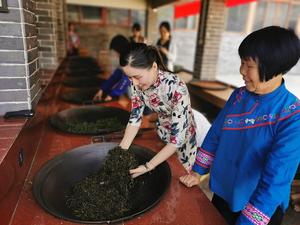 Shi Rufei (left) and Wei Jiequn stick to traditional handmade technique to process Liubao tea. (WANG KAIHAO / CHINA DAILY)
Shi Rufei (left) and Wei Jiequn stick to traditional handmade technique to process Liubao tea. (WANG KAIHAO / CHINA DAILY)
Nevertheless, the mundane work, no matter how rich a tradition, may not attract everyone.
Two of the couple's three daughters have opted to work in cities. The youngest daughter, Shi Rufei, joined the family business in 2006, after finishing junior high school.
"When I was a kid, I followed my grandfather in picking herbs for traditional medicine in the mountains," Shi says.
"Herbs, including tea, are part of my everyday life. I can't turn away from my family duties."
Unfortunately, Shi's father died from an illness in 2008. The duty suddenly fell on her young shoulders, although she was still an amateur in processing tea.
Practice was painful. The work blistered her hands. But it paid off.
Like her mother, Shi became a provincial-level inheritor of intangible cultural heritage in 2014.
"Though you follow certain formulas, you cannot be sure to get the same aroma every time," she says."This is the charming part of processing tea. We can only create some conditions and let it be."
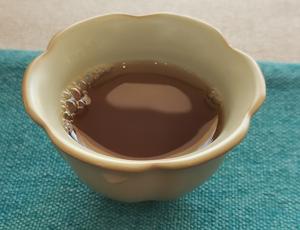 A cup of Liubao tea. (WANG KAIHAO / CHINA DAILY)
A cup of Liubao tea. (WANG KAIHAO / CHINA DAILY)
Liubao tea has 16 major types of fruity flavors that resemble such aromas as areca and litchi. Various aromas only appear during natural fermentation and mark different production years.
Shi's workshop employs about 30 technicians, as more people understand the value of processing using traditional and manual methods.
Shi says 1 kilogram of Liubao tea sells for between 200 yuan (US$29) and 400 yuan if processed by machine, but handmade tea can cost more than 800 yuan.
Today, almost every family in Tangping plants tea.
As an inheritor of intangible cultural heritage, Shi says it is essential to pass the tradition down to the younger generations.
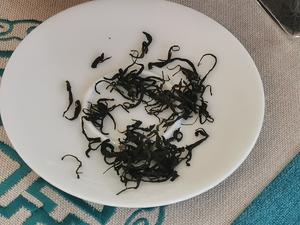 Fermented Liubao tea leaves. (WANG KAIHAO / CHINA DAILY)
Fermented Liubao tea leaves. (WANG KAIHAO / CHINA DAILY)
She has been teaching tea-related skills in the elementary school of the village.
Eyeing the future may also be indispensable to keep up with the market.
Although Shi calls Liubao tea a "drinkable antique", she says new methods are needed.
About 30 percent of the sales in her workshop now come from e-commerce.
Shi follows the trend of promoting tea by livestreaming. She has invited designers to create new packaging for the tea to appeal to young people, and opened a boutique teahouse in the village in July to create a better atmosphere for customers.
"In this quickly evolving era, if you miss information, you'll lag behind," she says.
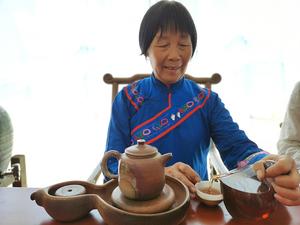 Wei Jiequn makes a cup of tea for visitors. (SHI RUIPENG / CHINA DAILY)
Wei Jiequn makes a cup of tea for visitors. (SHI RUIPENG / CHINA DAILY)
Tourism potential
According to government data, Liubao has about 2,800 hectares of tea plantations, accounting for one-third of the total tea-growing area in Wuzhou.
The gross value of this tea reached 6.8 billion yuan in Wuzhou in 2019. Over 360 hectares in the city were cultivated as new tea fields between January and April.
"People take more care of their health now," says Lin Zhuxiong, the mayor of Liubao, adding that cultural products themed on the local tea are also enhancing business.
"It can play a key role in reviving the rural market."
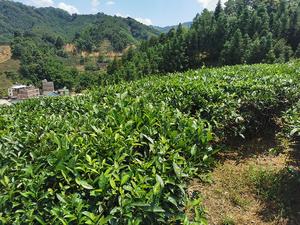 The tea plantation in Tangping village. (WANG KAIHAO / CHINA DAILY)
The tea plantation in Tangping village. (WANG KAIHAO / CHINA DAILY)
A research institute, a testing center and laboratories have been set up in Wuzhou in recent years to serve the industry.
The city also held a tea competition last year, encouraging cultivators to produce the best tea. An industrial park, covering nearly 70 hectares, is being constructed in Liubao.
Lin says it will become a new hub for the storage, logistics, financing and trade of Liubao tea.
"Hopefully, booming tourism will follow," Lin says.
"In addition to the industrial park, visitors can admire the historical glory of the 'tea boat road'."
Contact the writers through wangkaihao@chinadaily.com.cn


